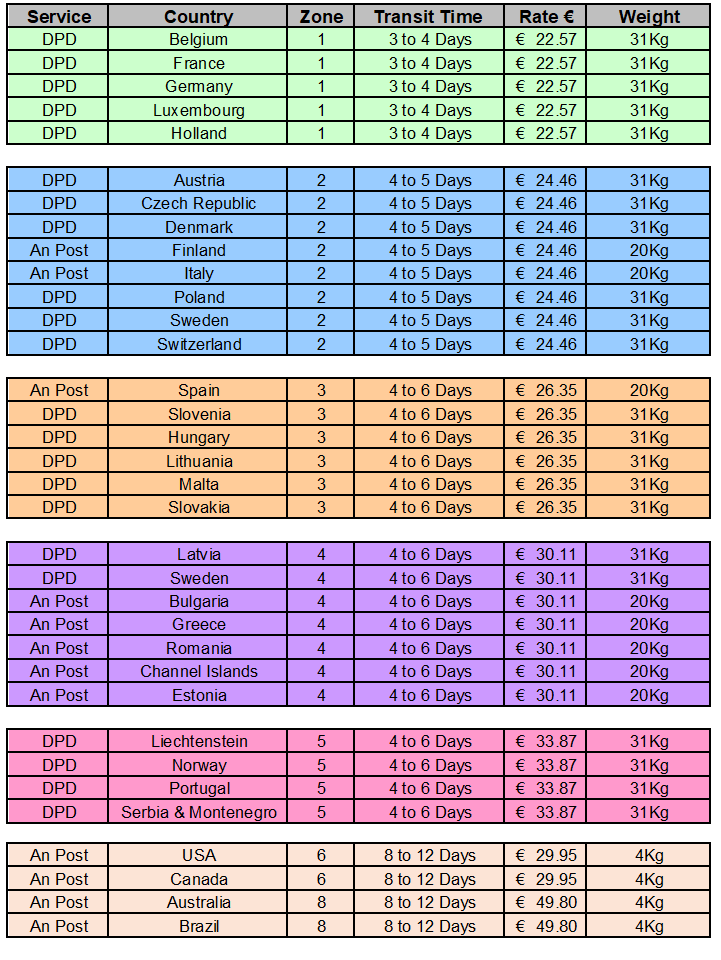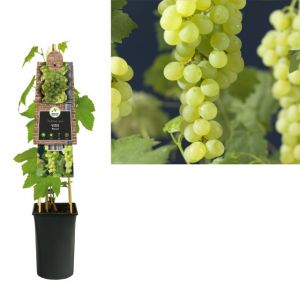Cart is empty
Vitis 'Himrod'
Common Name: Himrod Grape
Botanical Name: Vitis vinifera 'Himrod'
Plant Description
- Type: Hardy, seedless grape vine.
- Foliage: Attractive, large, dark green leaves that provide great coverage.
- Growth Habit: Deciduous vine with a vigorous climbing habit. It requires a trellis or support to grow upright.
Key Features
- Fruit: Vitis 'Himrod' produces medium-sized, golden-green, seedless grapes that are sweet, crisp, and perfect for fresh eating, juicing, or making wine.
- Maturity: The vine can grow up to 3 meters (10 feet) in height and spread, creating an elegant vine that adds beauty to any garden or outdoor space.
- Flowering: The vine flowers in late spring, followed by the formation of delicious grapes by late summer to early autumn (typically in August).
- Hardiness: Vitis 'Himrod' can tolerate cold down to -10°C.
Uses
- Edible Fruits: The grapes are sweet, seedless, and perfect for fresh consumption or use in recipes, jams, jellies, and more.
- Wine Production: Though primarily enjoyed fresh, 'Himrod' grapes are also used to make light white wines.
- Juices & Smoothies: These versatile grapes add natural sweetness and flavor to juices, smoothies, and desserts.
- Decorative: Grows beautifully on trellises, fences, or walls, making it an excellent choice for ornamental garden designs.
Growing Conditions
- Soil: Prefers well-drained, moderately fertile soil with a slightly alkaline to neutral pH.
- Sunlight: Grows best in full sun, which will result in the sweetest fruits. It can tolerate some partial shade, but fruit production may be reduced.
- Watering: Keep the soil consistently moist, especially during the growing season. However, avoid waterlogging, as this can damage the roots.
Planting & Care
- Planting: Plant your Vitis 'Himrod' vine in a sunny spot with well-drained soil. Ensure 1.5 meters of space between each vine to allow for proper air circulation and growth.
- Planting Time: Ideal planting time is during the spring or autumn, after the last frost, to encourage strong root establishment.
- Mulching: Apply mulch around the base to retain moisture, keep the roots cool, and suppress weed growth.
- Training: Train the vine on a trellis or vertical support structure for optimal growth.
- Pruning: Prune in winter or spring to remove dead or damaged growth. In early spring, cut back last year’s growth to encourage strong, new fruit-bearing shoots.
Aftercare
- Feeding: Feed in early spring with a balanced fertilizer to promote healthy growth. Avoid over-fertilizing with nitrogen, as it can encourage excessive leaf growth at the expense of fruiting.
- Watering: Water regularly, particularly during dry spells, but avoid letting the plant sit in waterlogged conditions.
- Disease Resistance: 'Himrod' is generally resistant to common grapevine diseases, but it is still important to check for pests such as aphids or fungal infections during the growing season.
Harvesting
- When to Harvest: Grapes are ready for harvest when they are firm, plump, and have a rich golden hue. They typically ripen by late summer to early autumn, depending on your climate.
- Storage: Grapes should be eaten fresh for optimal flavor, but they can also be stored in the fridge for a short time. Grapes do not ripen once harvested, so ensure they are fully ripe before picking.
Ideal for
- Gardeners looking for a hardy, high-yielding grapevine that thrives in colder climates.
- Home winemakers and those who want a sweet, seedless grape for fresh eating or juicing.
- Decorative gardens, where the vine can climb over trellises, fences, or arbors.
No posts found
Note: We don't ship plants on Fridays due to the extended period they would remain without light & water
Shipping Options & Rates
FOR IRELAND & NORTHERN IRELAND
- Standard Courier Delivery With An Post (3-4 Working Days)
- Cost is €4.95 on Orders Below €75
- Free Delivery on Orders Above €75
- Rep. of Ireland & Northern Ireland Only
- Express Courier Delivery With An Post (1-2 Working Days)
- Cost is €5 extra for express delivery
- This service guarantees that any order placed before 4pm will ship from our depot the same day on the next day delivery service *
- Rep. of Ireland & Northern Ireland Only
- Express Delivery With DPD (1-2 Working Days)
- Cost is €11.45 for orders below €75
- Cost is €6.50 for orders above €75
- This service guarantees that any order placed before 4pm will ship from our depot the same day on the next day delivery service *
- Rep. of Ireland & Northern Ireland Only
- This services comes with email tracking
- 'Seed' Postal Delivery Option ***
- Cost is €2 - Packet of Seeds ONLY Orders
- Note: Does Not Apply to Seed Potatoes, Bulbs or Sets ***
- Rep. of Ireland & Northern Ireland Only
- This is a non-trackable service
MAINLAND ENGLAND & SCOTLAND & WALES (Currently Unavailable Due to Brexit)
- Standard International Courier
- Cost is €10
- UK shipping fee covers parcels up to a total weight of 20Kg
WESTERN EUROPE & WORLDWIDE
- Standard International Courier
- Delivery rates vary, please see chart below
- Note: There is no free delivery for Western Europe Deliveries
Bulk Bags & Large Item Pallet Deliveries
- Bulk bags & large orders are shipped via pallet couriers on a rigid lorry
- Delivery is to kerbside only
- If road access to your site is tight, then please advise us before purchasing
- Please Note: We cannot guarantee next day delivery on pallet deliveries
- Also, we cannot guarantee delivery on a specific day (Please allow 1-3 days for delivery)
- It's always best to order well in advance to avoid disappointment
- Cancellation of pallets when items are already in transit will incur a 40 euro per pallet cancellation fee (To cover return delivery costs)
- Where pallet delivery can not be made due to site access, a 40 euro per pallet cancellation fee will apply (To cover return delivery costs)
International Delivery Prices & Times
- Please note max weights below, heavier orders may require additional payment
- We will contact you to discuss, if max weight of order exceeded

Terms
- The shipping fee is fixed for an order, regardless of the number of items bought
- All courier orders require signed proof of delivery & the customer must be contactable by phone
- We do not offer a weekend delivery service (Mon-Fri Only excl. Bank Holidays)
- * Our courier achieves a 98% success rate on next day deliveries
- Once your parcel is shipped it will be placed on works courier's next day delivery service
- ** Seed postal option applies to seed ONLY orders & is available in all 32 counties of Ireland
- *** Does not apply to seed potatoes, bulbs or sets



